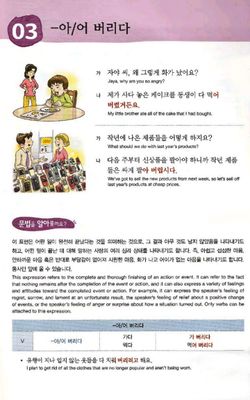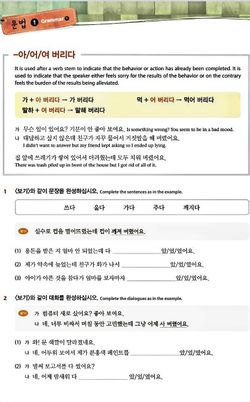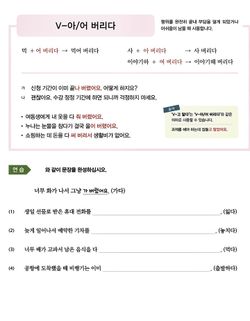Apr 20, 2022
기초 한국어 문법 ~ 아/어 버리다
아/어 버리다
The verb ~버리다 means “throw (it) away/dismiss/abandon,” as shown in
the following examples:
어제 옛 사진을 버렸어요 Yesterday, (I) discarded old pictures.
그녀가남편을 버렸어요 She abandoned (her) husband.
However, as an auxiliary verb ~어/어 버리다 means “do completely/end up doing/get (it) done.” Compare the following sentences”.
내일 편지를 부치세요 Send the letter tomorrow
내일 편지를 부쳐 버리세요Send the letter tomorrow.
The basic meanings of both sentences are the same. However, the message of the second sentence is stronger than the first sentence, since 아/어 버리다 adds the meaning of “completeness of the action.
아/어 버리다 does not imply that the completed action was a difficult
task. Instead, depending on the context, 아/어 버리다 is used to express a sense of regret or relief. Consider the following examples:
지갑을 잃었어요 (I) lost (my) wallet.
지갑을 잃어버렸어요 (I) lost (my) wallet.
Losing a wallet is undesirable. Consequently 아/어 버리다 in the second
sentence adds the sense of regret, while the first sentence simply states
the past action. It indicates that losing a wallet is not what the speaker
had expected or wished for.
Here are more examples that may denote a sense of regret:
1. 결국 울어 버렸어요 (She) finally cried.
2. 돈을 다 써 버렸어요 (I) used up all of (my) money.
3. 나오미가 결국 미국에 가 벼렸어요 Naomi finally went to America.
4. 제 동생이 벌써 다 먹어 버렸어요 My younger brother already ate
5. (them) all.
아/어 버리다 can also signify a sense of relief. Consider the following
two sentences:
숙제를 끝냈어요 (I) finished (my) homework.
숙제를 끝내 버렸어요 (I) finished (my) homework.
Notice that the referential messages of both sentences are the same.
However, 아/어 버리다 in the second sentence adds a sense of relief since the task (e.g., doing homework) has come to an end.
Here are more examples that indicate a sense of relief:
아픈 기억을 지워 버렸어요 (I) erased the painful memory (completely).
신용 카드 빚을 다 갚아 버렸어요 (I) paid all of (my) credit card debt.






By undefined
7 notes ・ 149 views
Korean
Elementary